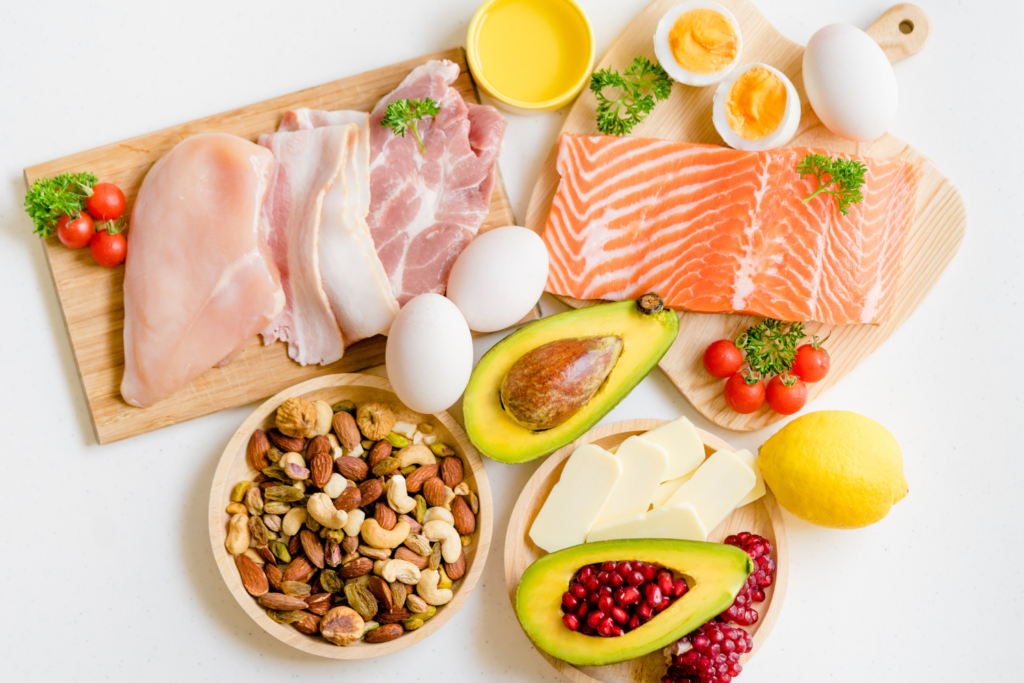The Smarter Resolution: “I’m going to exercise four times each week for 30 minutes.”
Why It Works: The more specific you can be, the more likely you are to stick to an exercise routine. When you carve out deliberate time for exercise, you won’t have any reason to skip it.
Moving more is the only way to burn fat and build muscle. Ideally, you want to focus on working up to lifting heavy weights, but incorporating cardio can help melt fat, too. Our rec? Combine ‘em both with fast paced strength building exercises with very little rest between sets. Heart rate up? Check. Muscles working? Check.
“I treat my exercise strategy just like I do an important meeting, but actually, it’s even more important” says Jennifer Fisher, national managing director of the Well-Being program at Deloitte, LLP. “For me, being specific about the when, where, and what of exercise removes the excuses. I even book it in my calendar.”
THE GOAL: “I’M MAKING IT A MISSION TO BE LESS STRESSED AND TIRED.”
The Smarter Resolution: “I will set an alarm to remind me to go to bed at a time that allows me to get 8 hours of quality sleep.”
Why It Works: We often get so caught up in what we’re doing during the evening that we forget to go to bed at a decent hour.
Sleep needs to be a priority if you want to lose weight, simply because you eat more when you’re short on shuteye. According to research from the U.K., people who slept an average of 3 to 5.5 hours a night ate an extra 385 calories the next day compared to people who got 7 to 12 hours of sleep. Not to mention, they typically chose foods high in empty calories, like chips and fast food.
That’s because your body churns out more ghrelin, a hunger-inducing hormone, and less leptin, a hormone that makes you feel full, when you don’t snooze enough, the researchers say.
But the quality of your sleep is just as important as the amount. Tossing and turning doesn’t help you hit the mark you need, and feeling sluggish the next day won’t motivate you to move. So before you crash for the night, make an effort to avoid your electronics an hour before bed—yes, that means no scrolling through social media.
Keeping your room cool and as dark as possible can help, too, says performance coach Brent Gallagher, C.S.C.S., co-owner of Avenu Fitness in Houston, Texas. The magic number? Around 19 degrees, research suggests.
The Smarter Resolution: “I will cut back on added sugar in my diet.”
Why It Works: Sugar as a whole gets demonized, but it’s really added sugar that’s the problem. The sugar in fruits and dairy are natural sugars, meaning they come packaged with other good-for-you nutrients like fiber and antioxidants.
Added sugars, on the other hand, are usually found in foods full of empty calories. According to the American Heart Association, men shouldn’t have more than 36 grams of added sugar per day—but you can easily get a chunk of that limit (or even surpass it) with one can of Coke, ¼ cup of sweet barbecue sauce, or a bottle of sweet tea.
Eliminating processed foods, especially sugary drinks, is a good place to start since they offer little nutritional value and excess calories. Once you’ve nixed those, you can slowly weed out other sweetened options, like certain cereals and packaged snacks.
When you get rid of those things, you make room for foods high in vitamins, minerals, and other beneficial nutrients, which are naturally lower in calories.
The Smarter Resolution: “I will eat a fruit and/or vegetable with every single meal, aiming for at least 5 total servings per day.”
Why It Works: “Eating healthy” doesn’t really mean much, but changing one small thing about your diet is a lot more specific (and attainable) than overhauling every single thing you eat. Plus, this way, you’ll be focusing on what you can eat, rather than what you can’t, which will help you avoid the restrictive mindset that often leads to cravings.
Fruits and vegetables are a good place to start, because according to data from the Centers for Disease Control and Prevention, only nine percent of Americans eat enough vegetables, while just 12 percent eat enough fruit.
That’s not great, since loading up on produce can be a tangible way to reduce your calories while bumping your nutrient intake. They also help fill you up without filling you out, because you can eat a ton of fruits and vegetables while taking in a minimal amount of calories.
That can be good news for your waistline because when you feel fuller for longer (thanks to the high fiber content found in most fruits and vegetables), you’re less likely to overeat at your next meal.
The Smarter Resolution: “I will plan my weekly meals on Sunday so I know what I’m having for dinner each night.”
Why It Works: Going out is great, but it certainly makes it more challenging to stay on track. At home, you have 100 percent control over what you eat. In fact, people who eat five or more home-cooked meals per week are actually 28 percent less likely to have an overweight body mass index and 24 percent less likely to have excess body fat than people who eat less than three home-cooked meals per week, according to a study from the U.K.
Why? Cooking at home may lead to healthier food prep methods (deep fryers aren’t exactly common in most households), helps you eat a larger variety of foods, and limits calorie- and sugar-packed convenience foods, the researchers note.
Take advantage of the convenient groceries that still pack a nutritional punch. Even picking up rotisserie chicken, frozen vegetables, and a minute bag of rice still allows you to prepare a quick, balanced meal at home without all the fuss. Even better, double up so you have leftovers for lunch the next day.
This article originally appeared on Men’s Health.
















